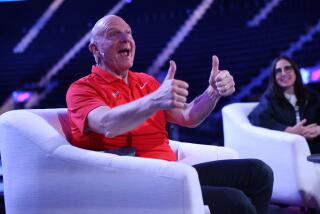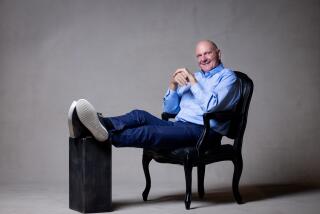Elgin Baylor testifies he was ‘crushed’ by Clippers’ decision to let him go
- Share via
Elgin Baylor testified Monday in his wrongful-termination lawsuit against the Clippers, saying he felt “insulted and humiliated” after receiving a letter in August 2008 that the team wanted him to become a consultant and retire after 22 years as an executive in the organization.
“I felt sick to my stomach. I felt crushed,” Baylor said as a seven-man, five-woman jury heard testimony in Los Angeles Superior Court.
Baylor, 76, is suing the team, Clippers owner Donald Sterling and President Andy Roeser for wrongful termination based on age discrimination. The Clippers deny any age discrimination.
Baylor, an 11-time All-Star with the Lakers who once scored 71 points in a game, said he lost 15 pounds and had trouble sleeping and became depressed after leaving his Clippers job. He said he began seeing a doctor and received therapy for close to two years.
He testified that Sterling and Roeser would constantly bring up his age in private conversations and ask, “How much longer are you going to do this?”
Baylor said many of the duties he thought were his responsibility as Clippers executive vice president and general manager, such as making trades and signing free agents, had been taken over by then-coach Mike Dunleavy.
When the Clippers acquired Marcus Camby in July 2008, Baylor testified he only learned of the trade when his secretary called to tell him to return to Los Angeles for a news conference.
Baylor said it was another phone call from his secretary informing him that the Clippers had signed free agent Ricky Davis in 2008. And Baylor said that summer he learned about the Clippers’ interest in signing free-agent Baron Davis only after overhearing a discussion between Roeser and Dunleavy while listening through the “thin walls” of the Clippers offices.
“I was shocked,” Baylor said when Dunleavy told him of the Clippers’ intent to sign Baron Davis.
Baylor said Sterling told him in 1993 he’d be “a lifer” with the Clippers and they shook hands.
“I relied on he was a man of his word,” Baylor said.
In afternoon cross examination, Clippers attorney Robert Platt presented an at-will employment document signed by Baylor that the Clippers could terminate him for any reason.
A video of a deposition by Baylor was also shown in court with Baylor answering “no” to the question of whether Sterling had ever given him instructions on what he should be doing as general manager.
Baylor is scheduled to resume his testimony Tuesday morning.
More to Read
Go beyond the scoreboard
Get the latest on L.A.'s teams in the daily Sports Report newsletter.
You may occasionally receive promotional content from the Los Angeles Times.











